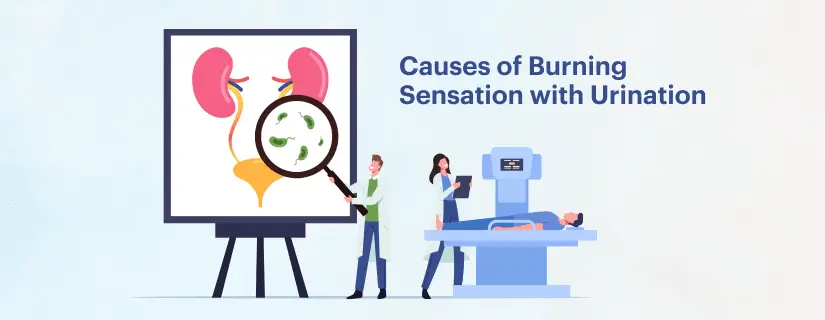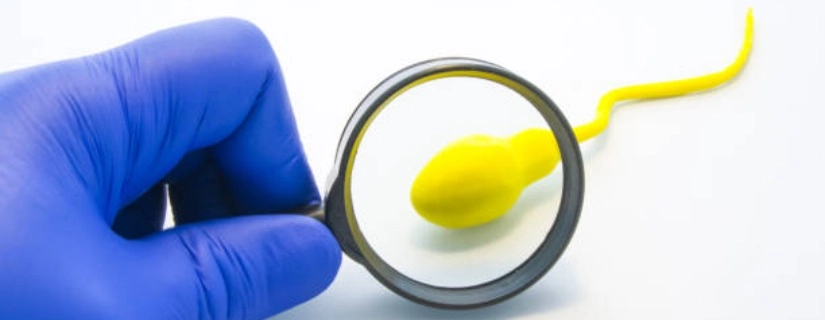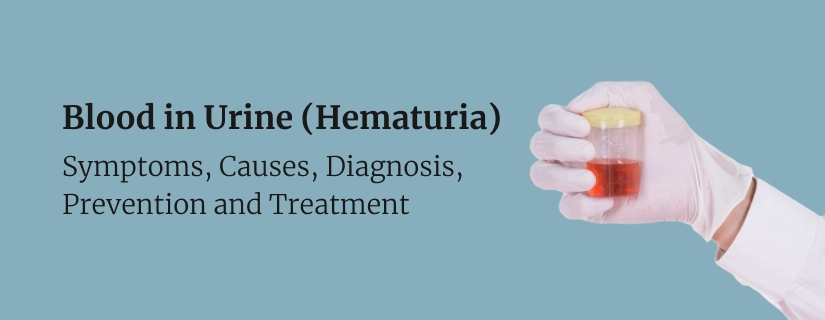-
Doctors
-
Specialities & Treatments
Centre of Excellence
Specialties
Treatments and Procedures
Hospitals & Directions HyderabadCARE Hospitals, Banjara Hills CARE Outpatient Centre, Banjara Hills CARE Hospitals, HITEC City CARE Hospitals, Nampally Gurunanak CARE Hospitals, Musheerabad CARE Hospitals Outpatient Centre, HITEC City CARE Hospitals, Malakpet
HyderabadCARE Hospitals, Banjara Hills CARE Outpatient Centre, Banjara Hills CARE Hospitals, HITEC City CARE Hospitals, Nampally Gurunanak CARE Hospitals, Musheerabad CARE Hospitals Outpatient Centre, HITEC City CARE Hospitals, Malakpet Raipur
Raipur
 Bhubaneswar
Bhubaneswar Visakhapatnam
Visakhapatnam
 Nagpur
Nagpur
 Indore
Indore
 Chh. Sambhajinagar
Chh. SambhajinagarClinics & Medical Centers
Book an AppointmentContact Us
Online Lab Reports
Book an Appointment
Consult Super-Specialist Doctors at CARE Hospitals
Causes of Burning Sensation During Urination
Updated on 3 August 2022

Dysuria (painful urination) is a broad term that refers to any type of urinary discomfort. This pain can be caused in the bladder, urethra, or perineum.
The tube that transfers pee from your body to the outside is known as the urethra. The perineum is the area between the scrotum/vagina and the anus in those who have a penis.
Urination that causes pain is fairly prevalent among people today. Pain, burning, or stinging can be caused by a variety of medical issues. Let’s explain the causes in detail.
Who gets dysuria (painful urination)?
Dysuria, or painful urination, can affect people of all ages and genders. However, certain factors can increase the risk, including urinary tract infections (UTIs), sexually transmitted infections (STIs), kidney stones, certain medications, and conditions like interstitial cystitis or vaginal infections.
What causes urinating to be painful?
- Infections of the urinary tract
A burning sensation while urinating hurts is a common symptom of a urinary tract infection (UTI). A urinary tract infection can be caused by a bacterial infection. Urinary tract inflammation could also be to blame.
The urethra, bladder, ureters, and kidneys make up the urinary tract. Urine is transported from the kidneys to the bladder via the ureters. Urinary pain can be caused by inflammation in any of these organs.
People with a vaginal canal are more susceptible than those with a penis to have UTIs. This is because those who have a vagina have a shorter urethra. Bacteria must travel a shorter distance to enter the bladder when the urethra is shorter.
Moreover, urinary tract infections are more common in pregnant women and women who have reached menopause.
- Sexually transmitted infections (STIs)
You might have pain when peeing if you have a sexually transmitted infection (STI). Some STIs that can cause painful urination include genital herpes, gonorrhoea, and chlamydia.
It's critical to get tested for STIs, especially since they don't often show any symptoms. Many sexually active persons should get tested for STIs at the urology hospital in Hyderabad.
- Epididymitis
Epididymitis, or inflammation of the epididymis in those who have a penis, can also cause painful urination. The epididymis, which is positioned behind the testicles, stores and transports sperm from the testes.
- Prostatitis
Urination pain can be caused by a variety of medical disorders. Prostatitis can cause painful urination in people who have a prostate. The prostate gland gets inflamed in this syndrome. It becomes a common cause of burning, stinging, and pain in the urinary tract.
- Urethritis
Urethritis is a condition in which there is inflammation in the urethra, usually as a result of a bacterial infection. Urethritis is characterised by urinary pain and an increased desire to pee.
- Inflammation of the pelvis (PID)
PID affects the fallopian tubes, ovaries, cervix, and uterus. Abdominal pain, uncomfortable intercourse, and painful urine are just a few of the symptoms.
PID is a dangerous condition caused by a bacterial infection that starts in the vaginal area and spreads to the reproductive organs.
- Cystitis
Another reason for painful urination is cystitis or inflammation of the bladder lining. Interstitial cystitis is also known as painful bladder syndrome (IC). This type of cystitis is the most common one. IC symptoms include pain and discomfort in the bladder and pelvic region.
Radiation therapy might induce bladder and urine pain in certain people, causing Radiation cystitis.
- Obstructive uropathy
When the ureter, bladder, or urethra become obstructed, urine flows back into the kidneys, causing obstructive uropathy. Although the causes differ, it is critical to seek medical attention as soon as symptoms appear.
Another ailment, urethral stricture, causes a constriction of the urethra, resulting in comparable urination and discomfort problems.
- Stones in the kidneys
Solidified masses of material in the urine tract are known as kidney stones. It could be difficult to urinate comfortably if you have kidney stones.
- Medications
As a side effect, several drugs, such as cancer treatments and antibiotics, can cause painful urination. Any side effects from medications you're taking should be discussed with your doctor.
- Hygiene supplies
Painful urination isn't always caused by an infection. It can also be brought on by the things you use in your genital area. Soaps, lotions, and bubble baths, in particular, can irritate vaginal tissues.
Dyes used in laundry detergents and other toiletries can irritate the skin and cause painful urination.
What are the symptoms of dysuria (painful urination)?
The symptoms of painful urination can differ between men and women, but individuals of both genders typically describe it as a sensation of burning, stinging, or itching. Among these, burning is the most frequently reported symptom experienced during urination.
- Discomfort or Burning Sensation: Dysuria typically presents as a persistent discomfort or burning sensation during urination. This sensation can range from mild to severe and may be felt in the urethra, bladder, or surrounding pelvic area.
- Frequent Urge to Urinate: People with dysuria often experience an increased frequency of urination. The need to urinate may arise more frequently than usual, even if the volume of urine passed is small.
- Urgency: Along with the increased frequency, dysuria can also be accompanied by a strong and urgent need to urinate. The sensation of urgency may arise suddenly and be difficult to postpone.
- Pain or Pressure in the Lower Abdomen: Some individuals may experience pain or pressure in the lower abdomen or pelvic region. This discomfort can be persistent or intermittent and may worsen during urination.
- Cloudy or Blood-Tinged Urine: Dysuria can cause changes in urine appearance. It may appear cloudy, indicating the presence of pus or bacteria, or it may have a reddish tinge due to blood in the urine.
- Foul Odor: Urine affected by dysuria can have a strong, unpleasant odor. This odor may be a result of an underlying infection or inflammation in the urinary tract.
- Discharge: In some cases, dysuria may be accompanied by abnormal discharge from the urethra. This discharge can vary in color and consistency and may be indicative of an infection or other urinary tract disorder.
- Pelvic Pain or Discomfort: Dysuria can sometimes be associated with pelvic pain or discomfort, which may extend to the lower back. This pain can be dull or sharp and may persist beyond urination.
- General Malaise: People experiencing dysuria may also feel generally unwell, fatigued, or have a low-grade fever. These symptoms are more likely to occur if dysuria is caused by an underlying infection.
How is dysuria (painful urination) diagnosed?
Diagnosing dysuria, or painful urination, involves a comprehensive evaluation by a healthcare professional. The diagnostic process typically includes a combination of medical history assessment, physical examination, and additional diagnostic tests if necessary. The aim is to identify the underlying cause of dysuria and provide appropriate treatment. Here is an overview of the diagnostic methods commonly used:
- Medical History: The healthcare provider will begin by taking a detailed medical history, including information about the patient's symptoms, the duration and frequency of dysuria episodes, any associated symptoms, and any recent urinary tract infections or sexual activity.
- Urine Sample Analysis: A urine sample is typically collected for urinalysis. This test can detect the presence of red and white blood cells, bacteria, or other substances that may indicate an infection or inflammation in the urinary tract.
- Imaging Studies: If the initial evaluation suggests a more complex underlying cause, imaging studies may be ordered. These may include ultrasound, CT scan, or MRI to visualize the urinary tract and assess for any abnormalities, such as kidney stones or structural abnormalities.
- Cystoscopy: In certain situations, a cystoscopy may be recommended. This procedure involves inserting a thin tube with a camera into the urethra to examine the urethra and bladder for any abnormalities, such as strictures or tumors.
- STI Testing: If sexually transmitted infections (STIs) are suspected, additional tests may be conducted to check for common infections such as chlamydia, gonorrhea, or herpes.
What are the possibilities for treating uncomfortable urination?
The first step in treating pain is to figure out what's causing it. To address painful urinating, your doctor may prescribe medication. Antibiotics can be used to treat urinary tract infections, bacterial infections, and sexually transmitted illnesses. Your doctor might also prescribe medicine to help you deal with your inflamed bladder.
When you start taking medicine for a bacterial illness, your painful urinating normally improves fast. When taking medication, always follow your doctor's directions. Some infections, such as interstitial cystitis, cause pain that is more difficult to manage. The effects of pharmacological therapy may take longer. It could take up to four months of medicine before you start to feel better. However, it can be treated with proper routine and medications.
The treatment for painful urination depends on the underlying cause. Infections such as UTIs or STIs are often treated with antibiotics prescribed by a healthcare professional. Drinking plenty of water and avoiding irritants like caffeine or spicy foods can also help alleviate discomfort. For other conditions causing dysuria, treatment may vary and should be determined by a doctor.
When to see your healthcare provider?

ENQUIRY FORM
SELECT CATEGORIES
-
Neurosciences (16)
-
Neurology (38)
-
Neurosurgery (14)
-
Orthopaedics (48)
-
Oncology (33)
-
Obstetrics and gynecology (52)
-
Pulmonology (23)
-
Urology (20)
-
Nephrology (13)
-
Psychiatry (7)
-
Dietetics and Nutrition (111)
-
General Medicine (63)
-
Cardiac Sciences (32)
-
Vascular & Endovascular Surgery and Interventional Radiology (15)
-
Gastroenterology (46)
-
Endocrinology (23)
-
Plastic Surgery (10)
-
Critical Care Medicine (5)
-
COVID-19 (16)
-
Dermatology (16)
-
Emergency Care (1)
-
Ophthalmology (4)
-
Pediatrics (14)
-
Laparoscopic and Bariatric Surgery (8)
-
ENT (15)
-
Kidney Transplant (1)
-
Liver Transplantation and Hepatobiliary Surgery (5)
-
General Surgery (3)
-
Internal Medicine (5)
-
Medicine Information
Urinary Tract Infection (UTI ) in Women: All You Need to Know
What Foods Cause Kidney Stones?
YOU MAY ALSO LIKE
RECENT BLOGS
-

Rotablation Angioplasty: Benefits, Treatments, And Recovery Time
6 February 2026
Read More
-

What Is The Difference Between IUI and IVF?
6 February 2026
Read More
-

Pulmonary Stenosis: Symptoms, Causes, Diagnosis and Treatments
6 February 2026
Read More
-

Difference between Angioplasty and Angiography
6 February 2026
Read More
-

Hemoptysis (Coughing Up Blood): Causes, Treatment and Home Remedies
2 February 2026
Read More
-

Leg Weakness: Causes, Symptoms and Treatment
9 January 2026
Read More
-

Back Pain After C-Section: Causes and Home Remedies
9 January 2026
Read More
-

Belly Button Pain (Periumbilical Pain): Causes, Treatment and When to See a Doctor
9 January 2026
Read More
Have a Question?
If you cannot find answers to your queries, please fill out the enquiry form or call the number below. We will contact you shortly.


















